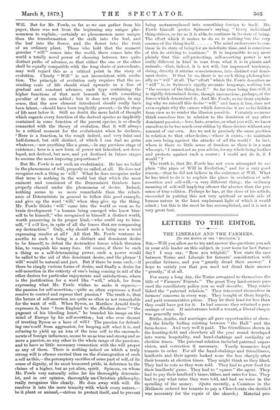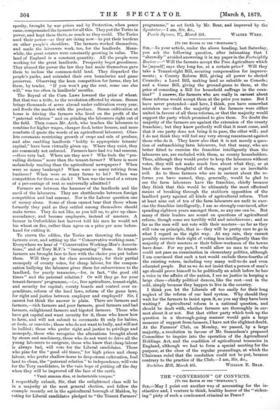LETTERS TO THE EDITOR.
THE LIBERALS AND THE FARMERS.
[TO THE EDITOR OF THE "SPECTATOR."]
you allow me to try and answer the questions you ask in your able leader on this subject, in your issue for last Satur- day? I may say, "Rem acu tetigisti." You state the case between Tories and Liberals for farmers' consideration with peculiar fairness, and you "greatly dread their answer." I hope to satisfy you that you need not dread their answer "greatly," if at all.
For many a long day, the Tories arrogated to themselves the title of "Farmers' Friends." The great Tory land-owners pur- sued the conciliatory policy you so well describe. They estab- lished the "paternal relation." They interested themselves in farmers' concerns in every way. They bought of them largely, and paid remunerative prices. They let their land for less than they could have got for it. In bad seasons they returned a per- centage of rent. If misfortunes befell a tenant, a liberal cheque was generally ready.
Births, deaths, and marriages all gave opportunities of show- ing the kindly feeling existing between "the Hall" and the farm-house. And very well it paid. The friendliness shown in the hunting-field and elsewhere all the year round developed into warm hospitality, and hand-shakings and cordiality at election times. The paternal relation included paternal super- vision, and correction if necessary. Yearly tenancies kept tenants in order. For all the hand-shakings and friendliness, landlords and their agents looked none the less sharply after their tenants at election times. They might think as they liked. They had to vote as they were told. They had to grow food for their landlords' game. They had to " square " the agent. They had to pay their landlord's taxes, tithes, and rates for him. They had to pay what rates they were told, and had no voice in the spending of the money. (Quite recently, a Countess in the Midlands ordered her tenants to pay a Church-rate she decided was necessary for the repair of the church.) Material pro-
sperity, brought by war prices and by Protection, when peace came, compensated the farmers for all this. They put the Tories in power, and kept them there, as much as they could. The Tories used their power—as they are doing now—to put their burdens on other people's shoulders. The farmers worked themselves, and made the labourers work, too, for the landlords. Mean- while, the great estates were constantly growing in value. The land of England is a constant quantity. All the people were working for the great landlords. Prosperity begot greediness.
They abused the power the law they had made themselves gave them to inclose the common-field land. They disparked the people's parks, and extended their own boundaries and game preserves. Observing the keen competition for farms, they let them, by tender. "If you won't pay the rent, some one else will," was too often in landlords' mouths.
The Repeal of the Corn Laws lowered the price of wheat.
But that was a trifle, to the revolution effected by steam. Steam brings thousands of acres abroad under cultivation every year, and floods the market with the produce. Steam cultivation at home is driving the farmers who lived on the profit of the "paternal relation" and on grinding the labourers right out of the field. Then comes Mr. Arch, who teaches the labourers to combine for higher wages, cheaper food, better houses, and more comforts (I quote the words of an agricultural labourer). Obso- lete covenants restricting growth of crops and sale of produce, and also enabling landlords "boldly to appropriate tenants' capital," have been virtually given up. Where they exist, they are commonly not enforced. Farmers have had ten bad seasons, —three very bad. Where are they now ? Who feels the " pre- vailing distress" more than the tenant-farmer? Where is more melancholy reading than the agricultural newspapers? When were so many bankrupt? When were so many retiring from business ? When were so many farms to let ? When was competition for them so slack ? When was the need of a return of a per-centage of rent so universally admitted ?
Farmers are between the hammer of the landlords and the anvil of the labourers. They are shuttlecocks between foreign competition and bad seasons. Nor is the Labour question one IA money alone. Some of them cannot bear that those whom formerly they paid as they settled among themselves should make terms. They do not like, as you tell us, to give up class- ascendancy, and become employers, instead of masters. A farmer in Oxfordshire last harvest told his men he would set his wheat on fire, rather than agree on a price per acre before- hand for cutting it.
To crown the edifice, the Tories are throwing the tenant- farmers over, and setting up the "Conservative working-man." Everywhere we hear of "Conservative Working-Men's Associa-
tions," and of Tory " inaugurating " them. So tenant- farmers are brought face to face with the choice you put before them. Will they go for class ascendancy, for their partial monopoly of county votes, for cheap labour, for the compen- sation bullying the labourer gives them for subservience to the landlord, for yearly tenancies,—for, in fact, "the good old times" and the paternal relation ? Or will they go for your tenant-farmers' programme,—i.e., free agriculture, tenant-right, and security for capital; county boards and control over ex- penditure, reform of the land laws, reform of the game laws, for right and justice between employer and employed? Sir, I cannot but think the answer is plain. There are farmers and farmers,—rich farmers and poor farmers, good farmers and bad farmers, enlightened farmers and bigoted farmers. Those who have got capital and want security for it, those who know how to farm, and will not submit to covenants fit only for babies, or fools, or convicts ; those who do not want to bully, and will not be bullied; those who prefer right and justice to privilege and monopoly, those who recognise the alterations brought about by steam and machinery, those who do not want to drive all the young labourers to emigrate, those who know that cheap labour is always bad, will vote for the Liberal candidates. Those who pine for the "good old times," for high prices and cheap labour, who prefer shallow-horse to deep-steam cultivation, foul land to clean, the "paternal relation" to independence, will vote for the Tory candidates, in the vain hope of putting off the day when they will be improved off the face of the earth.
" Venit summa dies, et inelnctabile tempts."
I respectfully submit, Sir, that the enlightened class will be in a majority at the next general election, and follow the example recently set in the agricultural borough of Maldon, by voting for Liberal candidates pledged to "the Tenant Farmers'
programme," as set forth by Mr. Bear, and improved by the Spectator.—I am, Sir, Sm., Powis Square, TK, March 6th. WALTER WREN.



































 Previous page
Previous page